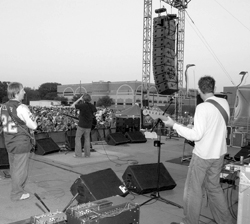
Further, artists can’t drive to any stages except the main one, because they’re all positioned among campus buildings. For this reason, full backline was provided at every stage, and musicians were discouraged from bringing more gear than they absolutely had to have. To accommodate this, the university set up a team of volunteers to ferry musicians and their gear to the stages. It took several years to streamline this process.
Once all the advance work was complete, we created stage plots and input lists for every stage, and for both days. These were then dispatched to the sound companies working the festival with us.
GETTING CLOSER
A pre-production meeting with the festival committee and all stage managers was held six weeks to two months out. Each committee reported on their progress and, although we weren’t involved in things like pizza ovens and beer sales, it helped us to know what was going to be happening around us.
Entertainment production is an important part of this meeting, and we made it a real bonding experience. Construction of “Stage 1,” for example, meant an entire campus parking lot has to be closed two days prior to the event, and thus it was critical that the timing be executed properly by the university security department.
We also got to meet the stage managers and orient them as to what was expected of them. These folks are critical for smooth-running shows, and we let them know that. While their duties are light, the few things we needed from them are all important to the show.
Other things covered in this all-important meeting were issues of water, green rooms, use of volunteers (there are hundreds!) and getting musicians to the event and their respective stages. Over the years, and learning from our mistakes, we developed methods to efficiently accomplish these tasks, but until you’ve worked with an event for a long time, these issues are extremely important to thoroughly think through. For example, from experience we all learned that as much water as we thought we needed – double it!
At this time, we also walked the campus with the festival director, making note of things like trees that needed trimming or light poles tp temporarily remove. (Grounds and electrical departments need to be notified in advance to schedule work like this!)
WHO’S DOING WHAT
By one month out, we had a firm grip on exactly who was doing what. For example, if there was a sound company short a monitor engineer, this was the time to step in and lend a hand. Each subcontractor provided us with a list of personnel and how many vehicles (and of what type) they would be bringing on site. One aspect to double-check: be sure each contractor is providing enough people. For example, backline duties done properly for six stages requires more than two techs.
At this point, we would tally up all production people (including stagehands and spotlight operators) and provide the festival director with the number of parking passes and wristbands needed. Remember – on a multi-day festival, each person might need a fresh wristband each day. We also padded this number by a few more to replace ones that were inevitably lost.
Very key: the best technical person on staff must be in charge of production management. Even with the best preparations, all kinds of little things can go wrong, especially at multiple stages. One person not involved in production at any one stage has to be free to fight the fires, and this person should be well versed in technical knowledge as well as diplomacy.
